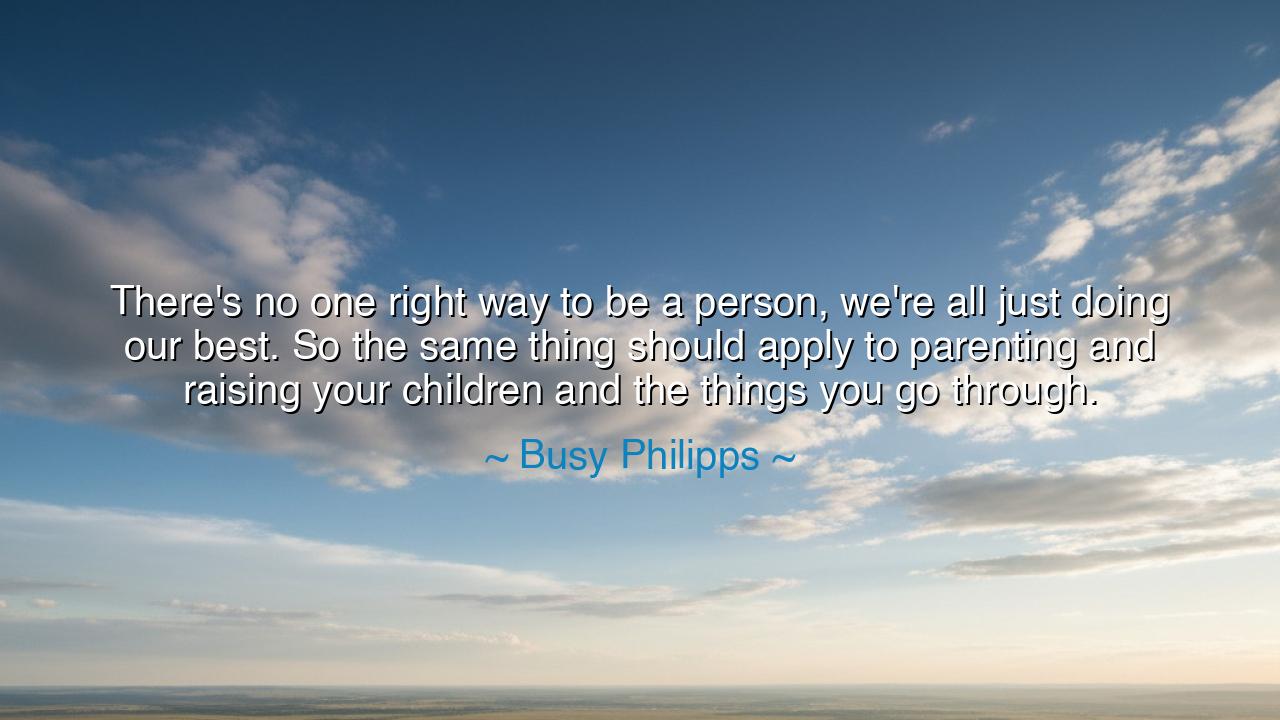
There's no one right way to be a person, we're all just doing
There's no one right way to be a person, we're all just doing our best. So the same thing should apply to parenting and raising your children and the things you go through.






Hearken, O children of generations yet to come, and attend to the humble yet profound wisdom of Busy Philipps, whose voice speaks with warmth and understanding: “There's no one right way to be a person, we're all just doing our best. So the same thing should apply to parenting and raising your children and the things you go through.” In these words lies a timeless truth: that life, human conduct, and the sacred labor of parenting are not governed by rigid formulas, but by sincerity, effort, and the courage to act with love and reflection.
The origin of this reflection rests in Philipps’ lived experience as both an individual and a parent, where she observed the complexity, unpredictability, and diversity of human nature. She recognizes that each child, each parent, and each household is unique, shaped by temperament, circumstance, and environment. Just as there is no single path to virtue or fulfillment in life, there is no singular method to raising children. Her insight is a meditation on humility, patience, and the acceptance of imperfection in the human journey.
The meaning of her words is both practical and moral. Parenting is a process of guidance, nurture, and moral shaping, yet it is undertaken by imperfect beings, striving amidst uncertainty. To acknowledge that “we're all just doing our best” is to temper judgment, to release the obsession with perfection, and to embrace effort, attentiveness, and love as the true measures of care. Philipps teaches that the cultivation of the child is inseparable from the humanity of the parent, and that compassion for oneself and others is the foundation of growth.
Consider the life of Abraham Lincoln, who, despite the weight of national leadership and personal loss, endeavored to raise his children with care and attention, though often imperfectly. His letters reveal guidance, moral instruction, and patience, yet also the frailty of human effort. Lincoln embodies Philipps’ insight: there is no singular formula for right action, but persistence, love, and reflection shape both character and legacy. Parenting is not perfection—it is intentional engagement with the young, even amidst uncertainty and limitation.
Yet Philipps’ reflection carries a subtle admonition: to measure oneself by rigid standards of perfection or to compare with others is to invite despair and doubt. The virtue of parenting is found not in replication of idealized models, but in authentic engagement, courage, and the application of best effort to the unique circumstances of one’s family. Each act of care, each lesson imparted, and each moment of presence becomes a testament to love and responsibility, even amidst imperfection.
The lesson for future generations is luminous: approach both life and parenting with humility, acceptance, and wholehearted effort. Recognize that each individual and each child is unique, and that the pursuit of perfection is less important than sincere engagement and reflective guidance. In doing one’s best, the parent models resilience, virtue, and compassion, laying the foundation for the child to grow with confidence, empathy, and understanding.
In practical life, one may follow Philipps’ counsel by cultivating patience, mindfulness, and intentionality. Attend to the child’s needs with care, respond to challenges with creativity and love, and accept your own limitations. Release the burden of comparison or fear of judgment, and act with integrity, reflection, and devotion. By embracing effort over perfection, one nurtures both the child and oneself, creating a household rooted in presence, care, and moral guidance.
Thus, O children of future ages, carry this teaching as both lamp and compass: there is no one right way to be a person, and none to parent either. Strive to do your best, act with love, and embrace reflection, patience, and understanding. In this way, the sacred labor of raising children becomes a path of growth, resilience, and virtue, a legacy of care and wisdom that endures across generations yet to inherit the art of nurturing and living well.






AAdministratorAdministrator
Welcome, honored guests. Please leave a comment, we will respond soon